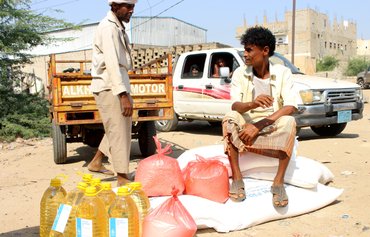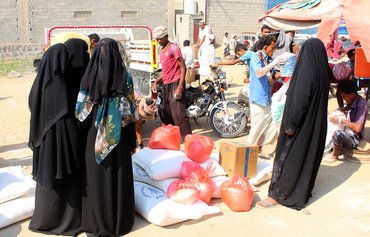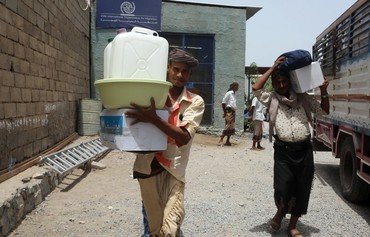The Iran-backed Houthis (Ansarallah) have been attempting to coerce the World Food Programme (WFP) into delivering cash aid by threatening to post videos online they claim will embarrass the UN agency.
In an April 7th social media post, the Houthis' second in command, Mohammed Ali al-Houthi, threatened to post videos that show WFP officials "agreeing to provisions with the Houthis".
Al-Houthi claimed the videos showed WFP officials contradicting the agency's official position, and threatened to release them if the pilot phase of the delivery of cash aid in some districts of Sanaa was not launched.
In the two weeks since al-Houthi issued his threat, the cash aid pilot phase has not been launched, and neither have the Houthis posted any such videos.
Yemen's Deputy Minister of Human Rights Nabil Abdul Hafeez described the Houthis threat to the WFP as "cheap blackmail".
The threat confirms the Houthis' "lack of consideration for citizens in the areas under their control who benefit from the food aid provided by the WFP", he told Al-Mashareq.
The WFP feeds more than 12 million Yemenis a month, the vast majority of whom reside in areas controlled by the Houthis.
The Houthis have been hindering the UN agency's delivery of food relief in the areas they control.
A relief worker in Sanaa who asked to remain anonymous told Al-Mashareq he lost his job at the end of March because the organisation he worked at closed its office in Yemen due to the drop in funding.
"I returned to working as a taxi driver," he said, adding that "the situation is getting more difficult for the [aid] beneficiaries".
International organisations under pressure
The Iran-backed militia seeks to exploit the WFP aid "by taking a certain cut or by interfering directly or indirectly and diverting a portion of the aid to itself", economist Abdul Aziz Thabet told Al-Mashareq.
More than 70% of Yemen's population lives in Houthi-controlled areas, he noted, which is why relief organisations concentrate their activities in these areas.
The Houthis have exerted pressure on these organisations to increase the amount of aid they provide, he added, accusing the militia of diverting the aid to support its war effort.
The Houthis' interference in the work of international organisations has "become intolerable for them, because they are unable to deliver aid to those who deserve it", political analyst Faisal Ahmed told Al-Mashareq.
International organisations face considerable risks "because they do not yield to the group's interferences, which occur even though the Houthis imposed pre-conditions on the organisations to allow them to run their programmes", he said.
Relief organisations, including the WFP, "have become fed up with the situation and cannot tolerate any more of this absurdity, and consequently, war-weary citizens will suffer the most", Ahmed said.

![Displaced Yemenis in Hajjah province receive humanitarian aid, donated by the World Food Programme in co-operation with the Danish Refugee Council, on December 30th. [Essa Ahmed/AFP]](/cnmi_am/images/2020/04/21/23592-Yemen-Hajjah-aid-600_384.jpg)







Wonderful!
Reply2 Comment(s)
Rather a saboteur and a terrorist!
Reply2 Comment(s)